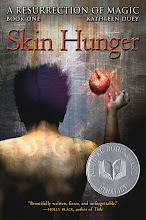Traditional publishing is still undergoing a sea change, a departure from many of the old models. It is a painful, wrenching///exciting, amazing new phase for storytellers and story sellers. The big-6 publishers are downsizing staff and have been for years. They are looking for new ways to be efficient and still create and sell great books. They are experimenting with incredible multimedia projects, and are sizing up the oncoming waves of reading devices and other story-vehicles. They still support great print books while releasing great ebooks. People who work at publishing houses are generally smart, dedicated to their work, and love a good story. They are also innovators who know how to adapt or morph.
It’s an echo of how itunes wiped the slate and gutted the album format. The big music studios said there would be a gazillion garage bands with 30 fans each. They turned out to be almost right. Even the TV mega talent shows rarely seem to launch careers the way the studios once did. On the other hand, the indie bands are thriving and I love the idea of artists of all kinds finding their audience, mega, big, small, global or local. Art belongs to everyone.
For now, at least, the publishers still offer writers what they always offered us: a long, steep learning curve that will eventually qualify some of us for access to incredible editors with critical reading skills and DEEP story experience--as well as informed and energetic marketing staffs. If a writer can captivate someone who has spent years reading and developing books....it's a good sign that lots of readers will find the work compelling, too. A sign, not a guarantee. There are none. There never have been.
Almost every career writer I know asks writing-friends to beta-read their raw work. I do. I often spend time on rewrites before my editors see it. I spent my learning-curve years in writing classes, reading a hundred or more books about writing, studying literature, reading, reading, reading, writing, writing, writing, and going to endless writer's conferences. I took notes while famous authors, incredible editors, artists, and agents shared what they had learned along the way. I still go to conferences. I get to speak now, but when I am not speaking, I am listening and I still take notes. I did all of this and more because no easier way was offered to me—or anyone else. There was no other way to enter into the career I wanted more than anything. I assumed a 5-10 year craft learning curve because that's what we were all told by the writers we listened to.
And now we are living in the golden age of self/indie-publishing. It is fascinating to me. 2.7 million indie books were released in 2010. Wow. I just clicked in “self publishing” and there were 10,200,000 hits. Wow again. It’s an industry.
A very few indie publishers have done really well. Some of these writers already had traditional careers and preferred to run their own show. Others are very good writers and marketers who came prepared and have worked hard. I admire indie authors. I want to try indie pub for some of my stranger/odder works next year. I can only applaud the time, energy, and money indie writers have poured into their work. The people who have done well have earned it! I am cheering for anyone who has even modest success on their own. I know they are doing ten jobs, all at once. I just want to say this:
Almost no one expects musicians to get good on an instrument without years of lessons, books, years of practice. There is a similar learning curve for writing. Mine was longer than I thought it would be. Traditional publishing used to give writers a free way to test readiness. I have a pile of rejections. Now writers are told to query agents first. They offer the same readiness test. If you get a positive response to your query, you send the manuscript or part of it and get more feedback, sometimes detailed, sometimes painful. For absolutely no fee at all, agents will let you know where your stand because if they take you on, they will have a stake in your success. Ditto old-school publishers. They put up the money and the staff.
Indie publishers do not offer that kind of service. It is almost certain that no craft/art/market specialists will be reading your work with that kind of careful, invested attention. It will get published anyway.
Without mentors and teachers and beta readers, learning to write it is like deciding to knit, buying yarn and needles, then sitting in your room alone, waving them around and hoping for a sweater.
If you don’t have critique partners, consider finding some. Take classes, read the kind of books you want to write. Read books about writing. Your library probably has a stack of them. Save up for conferences and if they offer critique staff, sign up to have your work evaluated. Take notes. Sift all the comments carefully. It’s your work, shape it. Experiment with guided revisions. Learn. Get good. Then publish any way you want to. There can never be enough good books.
If you write for kids and YA, consider http://www.scbwi.org/

